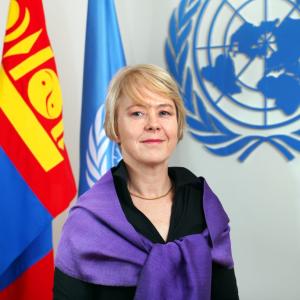Distinguished MPs,
Honourable Minister of Labour and Social Welfare,
Colleagues from the National UNESCO Commission,
Stakeholders from the public and private sectors,
UN colleagues and development partners,
I am delighted to join you today for the National Forum on Technical and Vocational Education and Training (TVET) Reform for Sustainable Development in Mongolia.
It is symbolic that this Forum is taking place at the very moment when Mongolia is finalising its very first Voluntary National Report on progress towards the Sustainable Development Goals. The SDGs aim to address the most pressing challenges facing people and the planet; to ensure a world free of poverty and capable of sustaining us all, by the year 2030. TVET is a critical building block towards reaching those goals. It is also a goal in itself (Goal 8): Decent work and economic growth, both of which depend on workers who are skilled.
Today’s globalized world is marked by rapid technological change, expanding markets, digitalization of work places and shifts in labour. This new world of work demands new knowledge and innovative skills. And with its TVET Reform, Mongolia is gearing up for the challenge.
The economy shows promising signs of recovery with growth reaching 6.5 percent last year. Mongolia’s economic diversification policy – including in agriculture and tourism – aims to open new job prospects, beyond the mining sector.
But current labour statistics remain worrying: 1 in 5 Mongolians are unable to get a job. Even young people returning to their home country from abroad, with high qualifications, and global experience, cannot find adequate employment in Mongolia. And these are people at the peak of their productive lives.
Transforming the TVET system can help create new jobs, and also change the scope and character of existing ones. We are excited to see the opening of two UN International Centers for Technical and Vocational Education and Training that will promote interaction on TVET issues within Mongolia, and beyond it, peer learning across regional networks.
This National Forum is organised as a multi-stakeholder gathering…. with good reason. Public-private partnerships and stakeholder collaboration are key to enabling and ensuring equal access of all people to developing the essential skills of work. Effective school to work transitions depend on strong partnerships with the private sector and interdisciplinary collaboration.
UNESCO emphasizes that TVET is part of lifelong learning, and can take place at secondary, post-secondary and tertiary levels. TVET can mean work-based learning. It can also be continuing training and professional development, which may lead to qualifications.
The picture will not be complete without putting in place TVET financing. And again, multiple stakeholder partnerships are needed to effectively mobilise the needed investments. The UN estimates that globally about two thirds of the funds needed to meet the SDGs must come from companies. So, businesses have a vital role to play in investing in TVET – and giving their current or future employees the skills they need to work at their best.
This is especially critical for women from vulnerable communities, young people, people of low income, people with disabilities, minority groups and people from remote areas, who are more likely to be left behind and excluded from educational opportunities and labour markets. The Sustainable Development Agenda cannot be realised if progress is not inclusive.
So while the reformed TVET must ensure equal access to learning opportunities and skills development for all, it must importantly also reach those furthest behind. And it must strike a balance between social, economic and environmental considerations.
I wish you all a productive dialogue over the next two days, towards a Mongolia that brings out the best in all its people, to take this economy forward in a sustainable, new era.
Thank you.




